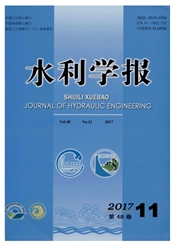

 中文摘要:
中文摘要:
阶梯-深潭系统作为一种新的消能结构在2009年用于文家沟滑坡体上新生沟谷的泥石流治理研究。阶梯-深潭系统在阶梯和水跃段耗散了水流大量的能量,使得水流中的能量减小到不足以触发泥石流,理论分析表明阶梯-深潭系统可以耗散水流三分之二的能量,即同样状况下触发泥石流的临界流量需增加三倍。阶梯-深潭系统使得水流阻力最大化,避免河床和岸坡遭受侵蚀。2009年的几次暴雨没有在文家沟引发泥石流。然而,2010年在沟内修筑了20道拦挡坝来代替阶梯-深潭系统,经过2010年8月暴雨后,20座拦挡坝全部被破坏。沟谷再次下切了50m。沟谷下切和侧蚀导致大量松散堆积物进入沟道形成泥石流,约450万m3冲出沟口,造成大量的房屋被埋以及14人死亡。比较两种防治方法可以看出,以消能为目的的阶梯-深潭系统对防治泥石流是成功的。拦挡坝在稳定的情况下可以减少边坡的垮塌,而阶梯-深潭系统还能够通过耗散水流能量稳定沟道,因此采用拦挡坝和阶梯-深潭系统相结合的方式来稳定滑坡体上的新生沟谷,并控制泥石流可能效果会更明显。
 英文摘要:
英文摘要:
Experiments were conducted with an artificial step-pool system on the new Wenjiagou Gully to mitigate large volume debris flows in 2009.The step-pool system dissipated flow energy in steps and hydraulic jumps.Analysis proved that the step-pool system dissipated 2/3 of the kinetic energy of flow,thus the critical discharge for triggering debris flow increased threefold.Due to the step-pool system maximized the flow resistance and protected the bed sediment and banks from erosion,the rainstorm floods in 2009 did not trigger debris flows.In 2010 the step-pool system was replaced with 20 check dams.Huge boulders were broken into small pieces of diameter less than 0.5m and were used as building materials for the 20 dams.Without the protection of the step-pool system,a rainstorm flood scoured the base of the dams and caused the failure of check dams in Aug.2010.The flow incised the gully bed by 50m.The loose bank materials slid into the flow mixed with water and formed a large volume debris flow with a volume of 4.5 million m3.Many houses were buried by the debris flow and 12 people were killed.Comparison of the two strategies proved that energy dissipation structures are necessary for controlling large volume debris flows.Check dams,if they are stable,may reduce the potential of bank failures and control debris flows.The step-pool system dissipates flow energy and control gully bed incision and bank failure.A combination of check dams and step-pool systems may be the most effective for mitigating debris flows.
 同期刊论文项目
同期刊论文项目
 同项目期刊论文
同项目期刊论文
 期刊信息
期刊信息
